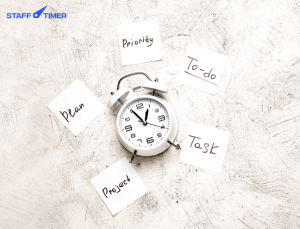Proven Strategies for Managing Stress in the Workplace
Mental health is becoming one of the most talked-about topics these days. The reason is more and more people are suffering from mental health issues like depression, and chronic stress in the workplace. Both can be different but interrelated, where one can lead to another.
With the rising of the corporate sector and unnecessary expectations or workload have made the workplaces vulnerable. Stress is the major setback for employee’s productibility.
Whenever a person lacks control over the situation with more expectations to meet, it causes them to panic. Unrealistic expectations can add a great deal to our stress levels, too. One can’t expect to find a remedy for the problem without identifying the problem first.
We need to grapple with stress stimulators first in order to rectify it. Although some stress is natural to the workplace, being over-stressed hinders productivity in a really detrimental way. How to know when one is suffering from excessive stress.
Signs of Stress may include
- Aggressive behavior
- Negativity
- Feeling lackluster
- Low self-esteem
- Alienation, and sense of worthlessness
- Feeling ill
- Mood swings
- Insomnia
- Lack of focus
- Nervousness
Everyone’s symptoms and defense mechanisms are different. It can be either fight or flight response, depending on the individual. Some are born warriors they would cope with stressful situations, whereas some will give up the struggle.
Stress is inevitable with work overload, time management, or difficulty of the task. Its a great hindrance in employee’s productivity. It’s not possible to design one’s work requirements completely in accordance with their desires, preferences, and aptitudes. Still one can find ways to make it as enjoyable and comfortable as possible.

Choose what you love most
The most basic recipe for staying happy at work is to choose a profession and career path that you enjoy most. If you adopted for certain professions because of family’s desires, social status or monetary gains, you are bound to stay unhappy.
So if you are feeling agitated at work then first ask yourself is that what you wanted? It’s very common that a stressed individual will get to hear that ‘why are you so depressed’ whereas many others are part of the same profession as yours, yet happy?
They fail to identify somebody who chose a medical or legal profession out of passion would be different from someone who joined it for social prestige. So the primary key to workplace satisfaction is to opt for what you love. You will still make money, in fact, financial factors can get disturbed more when you do what you abhor.
Stay away from negativity suppliers
Man is a social animal, and humans rely on other humans for emotional support. But sometimes the very same humans become a source of mental torture for others. They are the bastions of negativity in their surroundings.
If politics start infiltrating any workplace, it might become an emotional burden rather than relief. Maintaining a distance from trouble makers is the only way out. Since the beginning, one shouldn’t be too open to developing new connections or friendships.
Especially one needs to be cautious of ones who open up immediately after knowing you. There is a peach vs. coconut theory. According to which, there are people who are like peach, soft when you first bite but if you do it imprudently your teeth might hit its hard surface.
These are the ones looking cordial at first but terrible inside. They are more harmful than beneficial. Then there are coconut types. These are the ones who appear rude to many or might be reserved. They are the ones who will give you access after knowing and observing you.
Hard like coconuts from the surface but soft at core. So choose wisely who you befriend at the workplace. Everyone might not be well-wishers. One strategy to reduce stress is building healthy and positive relations.

Being overworked!
Humans are prone to maintain short term attention span, and they might seek diversity while doing the same thing for a long time. Sometimes work expectations exceed human capacity, and they start lagging behind. Besides at times, the workload is not compensated well so many feel disoriented from putting more effort.
One can always strive to maintain temperament without being too stressed. Taking short breaks in a while can help reduce stress in the workplace. Also, some background music or healthy humor with colleagues can help.
It’s more fruitful if employers begin to consider that work quality is damaged with being overworked.
Tasks should be assigned realistically, and whenever there is a compelling need for an increased workload, it should be compensated well. Stressed workforce won’t be able to provide productive output.
Work/Life balance
With prolonged work hours, and excessive workload some can’t manage to strike a balance between their work and family or social life. As a result disturbances in personal life can lead to a lack of productivity in the workforce.
Its more relevant for working mothers, who are unable to take part in their children’s activities, or join them for their school events causing them distress at work. There should be the provision of daycare at the workplace, and relaxation to take breaks between work schedules. Not to forget generous maternity leave is a must. A happy employee is the most productive employee.

Some preventive measures to counter stress in the workplace in Scandinavia
- Employees are given control over their routine to enhance productivity. Timings, and work conditions that can alter as per their preferences.
- Tasks are assigned according to the different mental and physical capabilities of employees.
- The controlled working environment is avoided.
- Work routine, organization, technology and distribution of hours are designed in a way not to cause strain to staff’s mental or physical health to affect their performance.
- Workplace encourages variety in work content and social exposure.
- Work has to build personal and professional development in an individual.
Work models in welfare states like that of Scandinavia and Canada can be an ideal model for other states to follow.
Adopt healthy life routine
- Take nutritious and vitamins rich diet to stay energetic. Avoid junk.
- Sleep well. One major cause of feeling listless at work is lack of sleep.
- Don’t over commit. Planning too many tasks ahead of time can cause a rush.
- Take small breaks from work and watch some funny memes and videos to feel refresh.
- When totally exhausted, take a vacation. Save your leave days for that purpose.
An efficient and healthy workforce is crucial for the stability and progress of any organization. Consequently, it plays part in constructing society as a whole and furthers the development of the state.
Moreover, work-related stress can be caused by poor work organization, poor management, unsatisfactory working conditions, and lack of support from employers. It is the responsibility of the organizations to help reduce stress in the workplace.





